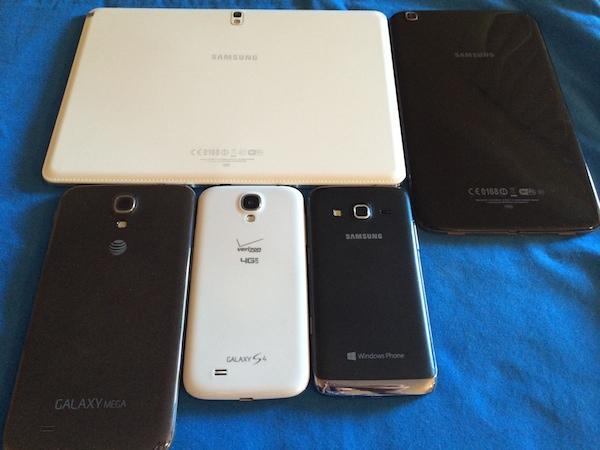
Samsung has a lot of people, all over the world, working on a lot of different things. It's been like that for a very long time, and it's probably not going to change anytime soon. The same can be said about Samsung Mobile, the division within the mothership that is Samsung that's focused on all things mobile. That's not just cell phones/smartphones anymore, though. We're talking tablets and now even wearable technology.
With more technology to design, develop and release, Samsung's resources are only going to get even more spread out. The question of whether or not this is negatively impacting Samsung, or any company out there that's doing the same thing, is still up in the air, but I would imagine Samsung would argue that it's not causing them much grief in the end. After all, they're still doing very well, and the company has gone from just another face in the Android crowd to being its most dominant force.
So, obviously something is working. And it's working quite well.
Even if I'm not personally a big fan of the proprietary software that Samsung uses on all of its devices (excluding a small few), I can't argue that Samsung has certainly made its name a household one, and that is presence in the Android community isn't simply a small ripple in a large Android ocean. Samsung is a force to be reckoned with, and they know it. Every company knows it.
But how'd it happen? It's a mix of a lot of things, but some folks would probably point to Samsung's extensive device library as a strong component of that success. The company has created a veritable laundry list of devices, ranging in sizes, functionality and usefulness over the years, all of which hoping to cover niche markets and screen size desires. If you want a device in some particular screen size, there's a strong chance that Samsung has you covered.
That can't be entirely it, though, can it? After all, other companies have done this sort of thing and for just as long, too. HTC, for example. A couple of years ago we were all commenting on the fact that the company just wouldn't *stop* releasing phones, much in the same way that Samsung handles releasing devices over the course of a year.
We've got the "normal" flagships, with their big displays. We've got minis, with their slimmed down displays and specs. There are megas, with the giant displays. And then there are the tablets that range in size, from small to huge. I wouldn't be surprised that if next year, or maybe the year after that, Samsung creates a Galaxy Gear series of devices, which focuses on wearables with different screen sizes.
Samsung has a lot of devices in the mobile market. I'm sure that they've got plans to release a lot of devices in 2014, too, just as they've done for so many years prior. But, maybe it's time for a little change. A change of pace. Maybe it's time to get a bit more focus on the devices that get the most attention -- and for the best reasons.
I don't think it's the fact that Samsung releases so many different devices that makes them so dang popular. I think it's quite the opposite. I think it's the devices like the Galaxy S 4, the Galaxy Note 3 and those specific device's predecessors. And when it comes to bigger devices? I want to see a laser focus on the Note lineup, rather than see more Mega-branded devices.
Having options is great. It really is. And I do understand the idea that having devices fill a wide range of markets makes sense, especially since you can't make everyone happy with a device with a 5-inch display. But there's a point where we've just got to thin the herd, and I think 2014 could be the year that Samsung does that with some success.
Why? Because I do believe that they'll be going with a different design aesthetic for their hardware next year. Instead of plastic, we'll see metal, and we'll see the Galaxy S and Galaxy Note lineups given a breath of fresh air, so to speak. Along with that, I think Samsung could whittle down the device lineup a bit (just to start), and put some more focus on the Galaxy S 5 and Galaxy Note 4 (or whatever they'll be called) to make sure that they're absolutely the best devices in their class.
If Samsung did that, I think it could go a long way to keeping them at the top of the Android hill. And project them even further ahead in the mobile market in general.
Will it happen? Who knows. Samsung has a lot of devices out there right now that will inevitably get a successor, so maybe not. But I do think it'd be a nice change. What do you think? Should Samsung start slowing down on different devices, and just put some more focus on a few select brands? Or should they keep doing what they're doing, and call it good? Let me know!